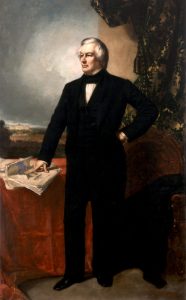Happy Birthday President Fillmore: Millard Fillmore, 13th President of the United States
“May God save the country, for it is evident that the people will not.” He read the patent for a stove in order to teach the White House cook to use the first stove installed in the White House. His wife set up the first White House library. He was a founding member of the Buffalo Chapter of the American Society for the Prevention of Cruelty to Animals. He is Millard Fillmore, 13th President of the United States, who served from July 9, 1850, to March 4, 1853. Millard was born on January 7, 1800, in Moravia, New York. He was one of six presidents born in a log cabin. Millard’s parents were poor and he had little education growing up, although he taught himself to read. He was apprenticed in a textile mill, however the hard work and terrible conditions made him unhappy, causing him to leave. He then began to study law under a judge, before studying at the law office of Asa Rice and Joseph Clary. In 1823 he was admitted to the New York bar. He married Abigail Powers in 1826, with whom he had two children. She had been a teacher at a school he attended.
 Throughout the 1820s and 30s, Millard was a member of the New York Militia, where he achieved the rank of Major. In 1831, he joined the Unitarian church. Millard was vocal about supporting the separation of politics and religion.
Throughout the 1820s and 30s, Millard was a member of the New York Militia, where he achieved the rank of Major. In 1831, he joined the Unitarian church. Millard was vocal about supporting the separation of politics and religion.
Millard’s political career began when he joined the Anti-Masonic Party. He later joined the Whig Party. Beginning in 1829, he served three, one-year terms in the New York State Assembly. During his final term, Millard chaired a special legislative committee which formed a new bankruptcy law that eliminated debtors’ prisons. In order to get the law passed, Millard allowed the Democrats to take credit for the bill. Millard’s apparent aversion to the limelight would later be a favorable characteristic on the national political level.
Following his terms in the State Assembly, Millard went on to serve as a US Representative, twice being re-elected. Millard refused a fourth nomination in 1842. While a member of Congress, Millard opposed slavery and the slave trade, advocating for its prohibition. He also advocated for the exclusion of slavery in Texas and the District of Columbia. He was nearly elected Speaker of the House in 1841, and served as chair of the House Ways and Means Committee.
Millard unsuccessfully attempted to become governor of New York in 1844. After his defeat for the governorship, he helped establish the University at Buffalo. In 1844, he was elected New York State Comptroller. During this time, Millard revised New York’s banks system, which became a model for the future National Banking System.
In 1848, Millard was selected to run as vice-president, with General Zachary Taylor as the presidential nominee. Millard was anti-slavery, and, unknown to most, also supported sending African-Americans back to Africa. During the 1850s, slavery in newly admitted states became a divisive topic, with the North wanting slavery excluded from new states and the South demanding that slavery be an option to all states.
On July 9, 1850, President Zachary Taylor suddenly died, although he had been feeling unwell since eating cherries and iced milk on July 4. Millard was sworn in as president at noon on July 10, 1850. Taylor’s entire cabinet resigned following Millard’s swearing in. Millard was the final president that was neither a Democrat or Republican.
During his time as president, Millard passed the Compromise of 1850, which prolonged the splitting of the Union. The South wanted to expanded slavery into the Caribbean by taking Cuba, although Millard refused to support such an invasion. Also internationally, Millard worked to keep the Hawaiian Islands out of European hands and to open trade with Japan, which at the time still prohibited nearly all foreign contact. Millard’s goal was ultimately successful, although not until he was out of office.
 Domestically, Millard’s greatest difficulty dealt with the Fugitive Slave Act. Southerns insisted that it be rigidly enforced, but enforcing the act, which would return fugitive slaves in the North to their owners, was offensive to Northerns. Ultimately, Millard enforced the Act, which largely contributed to him not receiving a nomination for president in 1852. In 1850, Millard appointed Brigham Young as the first governor of the Utah Territory.
Domestically, Millard’s greatest difficulty dealt with the Fugitive Slave Act. Southerns insisted that it be rigidly enforced, but enforcing the act, which would return fugitive slaves in the North to their owners, was offensive to Northerns. Ultimately, Millard enforced the Act, which largely contributed to him not receiving a nomination for president in 1852. In 1850, Millard appointed Brigham Young as the first governor of the Utah Territory.
After leaving office, Millard attempted to run for president under the American Party in 1856, but he was unsuccessful. Millard criticized the actions of Presidents James Buchanan and Abraham Lincoln. He supported the reconstruction efforts of President Andrew Johnson. Millard refused an honorary Doctor of Civil Law degree from the University of Oxford stating he was not qualified and that he could not read the Latin text on the diploma. After his first wife died in 1853, Millard remarried to Carolin McIntosh in 1858. Following the assassination of President Abraham Lincoln, Millard’s house was attacked by protestors, as he had not put up black bunting for mourning. Millard explained to the crowd outside his home that he had been with his ill wife and did not know of Lincoln’s death. His answer caused the crowd to disperse.
On March 8, 1874, at 11:10 pm, in Buffalo, New York, Millard died from the aftereffects of a stroke. He was 74 years of age.
Happy Birthday Mr. President!
For more information regarding how your financial support can help, please click here.
